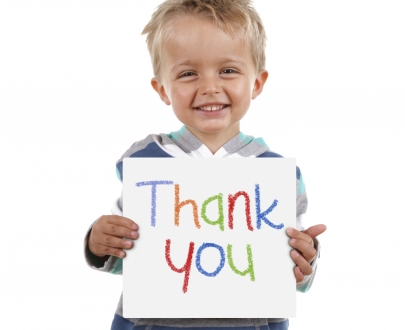
Early in life, many toddlers are taught to say or sign “thank you” in ongoing attempts to encourage children to be polite and show appreciation. We’ve all experienced social moments when children are prodded by parents to “say thank you.” This can be awkward because while these small social moments are great learning opportunities for children, someone not doing the direct “teaching” may be unsure how to react.
Developmentally, the window of opportunity for gratitude to truly take root is believed to begin around age 7. It is at this time that children begin to develop a more complex understanding of emotions - their own and those of others. With a lot of practice (and coaching), emotional understanding, social interaction skills and empathy merge and open the door to authentic feelings of gratitude. Through middle childhood (9-11) and into adolescence, children continue to hone their ability to take on the perspectives of others, see other people’s actions with empathy, and experience being grateful.
Showing gratitude is much more than good manners and the resulting physical, social and emotional rewards are many. Gratitude research falls into the realm of positive psychology and is linked to the following benefits:
- physical health[1]
- sleep quality[2]
- resilience [3]
- stronger relationships [4]
- promoting forgiveness[5]
- feeling better about school, having better grades, and life satisfaction[6]
The gifts of gratitude go both ways! Research shows that expressed gratitude positively affects the “giver” and the gratitude “receiver”. For example, people who are thanked are more likely to behave positively towards to the person who thanked them (and to others) in the future. There is a gratitude theory called find-remind-and-bind[7] which suggests that expressing gratitude is a key hook and catalyst in building strong and positive relationships.
Next time you see a parent prod their child to “say thank you”, help maximize the learning moment by appreciating the gesture and acknowledging the child (and parent) for offering the gift of gratitude.
In a discussion between Dr. Jane Hart (clinical instructor in internal medicine) and gratitude researcher Robert Emmons, gratitude is described as being associated with higher levels of high density lipoprotein cholesterol, heart rate variability and lower levels of blood pressure.
A study with 401 research subjects found an association between gratitude and total improved sleep quality after controlling for many influencing factors. Researchers concluded that the reason for this was that when falling asleep, grateful people are less likely to think negative and worrying thoughts, and more likely to think positive thoughts.
In a study of college students following the terrorist attacks of Sept. 11th, 2001, researchers looked at the connection between positive emotions (including gratitude) and emotional resilience among college students. They found that grateful people are, indeed, buffered from depression and other setbacks during a crisis.
Dr. Sara Algoe's research looks at gratitude and relationships. In a study involving college students during a gift-giving tradition (2008), resulting observations demonstrate her theory that gratitude functions in both the formation and maintenance of relationships.
In a review of the literature related to gratitude, Emmons and Stern suggest that gratitude is an effective intervention to foster positive mental health when it acts as a mechanism for emotional healing.
In an examination of materialism in adolescents, it was found that gratitude uniquely predicts higher grade point average, life satisfaction, social integration, as well as lower envy and depression. In contrast, materialism, controlling for gratitude, uniquely predicts lower grade point average and higher envy.
Further work by Froh et. al (2010) shows that youth who initially scored high in measures of gratitude had higher overall life satisfaction after 3 months and demonstrated more prosocial behaviour and self-reported stronger social connections after 6 months.
The find-remind-and-bind theory of gratitude suggests that the positive emotion of gratitude serves to strengthen a relationship by updating the perspective of one another. Expressed gratitude in a relationship positively affects both the recipient and the benefactor and further prompts an increase in prosocial behaviour.